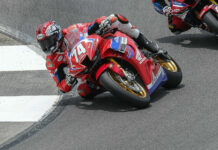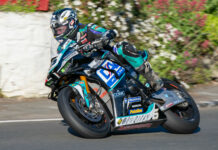It may be a mistake to lay the blame for American Honda’s withdrawal from AMA Superbike racing in 2010 solely at the feet of the Daytona Motorsports Group. Ray Blank, Senior Vice President with American Honda, had serious issues with the way the series was run in the past, and the crap economy makes it really easy for any company to pull out of any expenditure that doesn’t immediately and directly improve the bottom line.
But it would also be a mistake to ignore Blank’s concerns about the current operators of the series, because Blank’s concerns are shared by others and should serve as a wake-up call to DMG. Some of the things DMG has done this season particularly in the area of regulations and enforcement have alienated even its strongest supporters, and left fans scratching their heads.
In a recent interview with Roadracingworld.com, Blank laid out his major concerns about the series, and the reasons Honda will not be participating in either American Superbike or Daytona SportBike in 2010 either as a factory effort or as support for satellite operations.
Rules and their enforcement are among the biggest areas of concern for Honda, Blank says.
“The most important object a sanctioning body provides is a rulebook. The rulebook is the Bible. The Bible, or the Koran, or the Torah, any of the great religious books don’t change much,” Blank says. “When a rulebook goes through constant changes, as we’ve seen recently or frankly at end of my tenure with the AMA, you have to question whether the religion is the same one you started with. The most important thing sanctioning provides is a well-founded rulebook.”
(Blank left the AMA’s Board of Directors in 2006 after the AMA approved the purpose-built Buell XBRR for Formula Xtreme competition against street-based motorcycles. “I remember hearing that ruling and thinking, you can’t really be saying that. You can’t be saying that,” Blank says.)
So it was deja vu all over again for Blank when the AMA announced earlier this year that a purpose-built homologation special Buell 1125RR would be allowed into American Superbike competition. For Blank, that was a hard pill to swallow after trying to come to grips with the fact that the CBR600RR would be racing against the Buell 1125R in Daytona SportBike.
The problem, Blank says, is that American race fans have seen the middleweight class as the place for racing 600s, and the new class structure changes what they’re used to seeing. It doesn’t matter if the rules of physics and engineering–and actual race stats–say that the big V-Twin (6 race wins in 2009) and the middleweight inline four-cylinder machines (14 race wins in 2009) are competitive. Honda and Inline Four fans saw the displacement numbers and quickly decided that the rules were unfairly stacked against their bike the one they had in the garage, the one they tuned in to see on the podium.
“It (SuperSport, which has morphed into Daytona SportBike) was the place for the four Japanese OEMs to get out there with their 600cc Inline Fours and race. We debated a year and a half before allowing the 748 into the class,” Blank says. “And when we saw the (new) rulebook with a bike that has double the displacement well, the customer’s perception I know from conversations I’ve had with spectators that they don’t want to see their bike abused by a bike that has twice its displacement. And now in Superbike, you’ve got a $40,000 homologation-buster, a bike that’s clearly illegal, that comes out of nowhere and is allowed this rule came out of nowhere. By that time, we were basically out of it at that point.”
Blank says that DMG’s twisting of the rulebook this season has damaged its credibility with Honda.
“To the degree possible using the English language, they (rules) have to be in black and white. There was a great deal of talk when DMG first started I think the first line in the rule book is, ‘If it doesn’t say you can, you can’t.’ That is an easy rulebook to enforce. But what has happened is that it has evolved into, ‘If it doesn’t address it, it’s our interpretation, and that’s the way it is.’ It’s turned into, ‘This is our interpretation, and that’s the one that is the rule.'”
This does not give a company a basis upon which to commit resources for a race program, Blank says. If you can’t trust the sanctioning body to enforce its own rules, how can a manufacturer commit resources to the series?
Enforcement also has been a problem, Blank says. He points to jump-start penalties like the ones assessed at Road America and New Jersey Motorsports Park as something that simply alienates fans and participants alike. In the case of one rider at New Jersey, a grid marshal decided that the rider had moved, although the official was unable to see any movement with the naked eye, and although the rider obtained no advantage from the alleged movement. For that one rider, race officials used a frame-by-frame analysis of the starting grid camera footage and determined that however incrementally, the motorcycle had moved, and called the rider in for a ride through penalty.
“I can certainly understand the principle there, but there are certain reasons that that rule (that bikes can’t leave their starting grid box) had been standard for such a long time,” Blank says. “How much did it move in the box? What direction did it move? Are bars wiggling? If the bike is going backward, is that OK? The intent is ‘Don’t clear the box.’ But the interpretation is, ‘You jiggled.’ And that’s not OK. I think a lot of people jiggle in the box. If I were there, I’d be jiggling. But I think only certain people were called out for jiggling.”
Decisions like those cited above in the rulebook and on the track make it difficult for the fan to connect with the racing, Blank says.
“I sit down on Sunday afternoon to watch (AMA Superbike racing) with my three sons, and they’re asking, ‘Why is there a homologation special in the class? You used to build those, I thought you changed it to make it so you couldn’t do that anymore. Why is that?’ And all I can say is, I dunno,” Blank says.
“The things I hear from customers nobody’s happy with the series. Nobody understands. They don’t understand why someone moves a quarter-inch and gets a meatball for it they don’t get it.
“Racing must be comprehensible. Comprehensibility in racing is something that’s hard to achieve, but it is one of the most important things you can put into racing. One-make racing is easy to understand. SuperSport was easy to understand. Supercross, Motocross, Arenacross one of the reasons Anaheim Stadium fills up three times a year is that the spectator understands what they are seeing and can relate to what is in their garage.”
So if the fans aren’t happy, and the company doesn’t benefit from racing, there’s no reason for Honda to be involved in the series, Blank says.
“We go racing for three reasons: To make customers happy, improve the breed, or to use as a marketing platform to sell bikes from,” Blank says. “We’re not seeing any of those now.
“Frankly, we wouldn’t have done the Corona deal for this season if we’d heard about the rules early enough. But we maintained our obligations. We had a chance to talk to DMG before making decisions about 2010, and we found out that nothing was going to change. So when it comes to the two primary classes, we are not going to participate. We supported satellite teams this year because we were committed. But if nothing is going to change, we’re not going to renew those commitments.
“Now, I don’t know if we’ve heard the last of the offerings. What’s been presented so far doesn’t meet our three criteria. If it changes, will we participate next year? It’s awfully late. That, coupled with the very difficult financial situation in the motorcycle industry right now if you can’t make the argument that this helps you, provides a stable platform that helps you sell or improve bikes I guess you do what we did.
“We have to be able to substantiate and validate advertising dollars spent today. We have to be able to sell motorcycles to support racing. If it’s not validated as an effective marketing approach, we can’t do it. And I can’t say I can take the current AMA racing series to my boss, look him in the face and say, we should do this because it will help us sell more bikes I can’t say it. How do I spend the money to support a race in where ever if the attendance and TV viewership was where it was this year? I can’t.”






